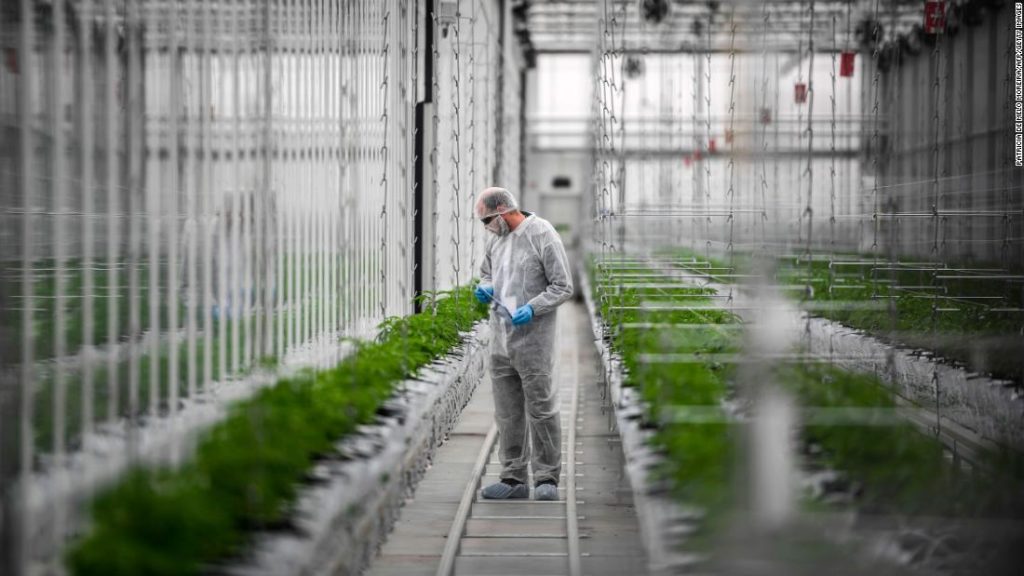Driving much of the action is the Marijuana Opportunity Reinvestment and Expungement Act, or MORE Act, which was reintroduced by Democratic House Judiciary Committee Chair Jerry Nadler last Friday.
The bill would decriminalize marijuana at the federal level by removing it from a list of controlled substances and reassess previous marijuana convictions.
“Despite the low chances that the Act is passed [in] the Senate (due to the filibuster), increasing media coverage is likely to attract the attention of the average retail investor,” Vanda’s Ben Onatibia and Giacomo Pierantoni told clients on Wednesday.
They noted that Sundial and Tilray were the fourth and seventh most mentioned stocks in the popular Reddit WallStreetBets forum on Tuesday.
Amazon’s big announcement could feed the hype. In a blog post, Dave Clark, CEO of Amazon’s worldwide consumer division, said changing state laws on marijuana mean the company will no longer include the substance in pre-employment drug tests. The internet giant is also endorsing the MORE Act.
“We hope other employers will join us, and that policymakers will act swiftly to pass this law,” Clark said.
Cannabis companies are paying close attention.
“We remain focused on advancing our US ecosystem and expect significant cannabis reform to take place during this Congress,” Canopy Growth CEO David Klein told analysts on Tuesday. He said that there has been “substantial bipartisan momentum over the last couple of months.”
What’s next: The S&P/TSX Cannabis Index has been in the red for the past three months, but remains up 33% year-to-date after soaring in January and February. Will Reddit love and Amazon’s shift be enough to trigger another buying spree?
The latest corporate hack is roiling the meat market
Shoppers may need to brace themselves for yet another supply crunch, my CNN Business colleagues Danielle Wiener-Bronner and Angus Watson report.
The details: Major beef and pork producer JBS was the latest company to suffer a cyberattack over the weekend, prompting shutdowns at plants in North America and Australia. The White House has said that the ransomware attack was likely carried out by a Russia-based criminal organization.
The company, authorities and trade groups are offering assurances that operations will be back to normal as soon as possible. JBS has said that “the vast majority” of its food plants will be open Wednesday.
But closures could still be felt across supply chains.
“Even one day of disruption will significantly impact the beef market and wholesale beef prices,” Steiner Consulting Group, which specializes in commodity prices, wrote in a research note.
David Littleproud, the Australian minister for agriculture, drought and emergency management, told CNN Business Wednesday that the country does not believe there will be a red meat shortage, even though JBS accounts for about a quarter of the country’s red meat processing.
“But we are obviously concerned that there are today limited operations at JBS facilities in New South Wales and Victoria,” he said. “Some work may resume in Queensland tomorrow. We’re hoping that they will get back to full capacity soon, but there is no definitive timeline.”
Steve Meyer, an economist with commodity firm Kerns and Associates, agreed that a one or two day disruption could cause wholesale meat prices to jump. But if the problem is resolved within a few days, he said, restaurants and grocery stores are unlikely to pass those costs onto consumers.
Investor insight: While the price of meat could temporarily rise, cattle futures have dropped, since JBS has had to stop slaughtering cows while it deals with the hack.
‘Baby Shark’ backer gets the Elon Musk treatment
Elon Musk has turned his attention from Shiba Inu dogs to baby sharks — and investors are singing along.
“Baby Shark crushes all! More views than humans,” Musk wrote, referring to the catchy children’s song, which became the most viewed video ever on YouTube in November.
Soon after the tweet, Samsung Publishing’s stock surged as much as 10% to 49,000 won ($44) in South Korea. It lost some of those gains later, but still closed up some 6%, its best day in nearly a month.
Musk’s tweets notoriously move markets. For months, the billionaire has been plugging dogecoin, the meme cryptocurrency featuring a dog face. His backing helped feed astronomical price gains ahead of the recent crypto crash.
But Musk’s online musings are being watched closely. Previous tweets about his own businesses landed him in trouble with the US Securities and Exchange Commission. Tesla lawyers are now required to pre-approve his tweets if they concern the company’s financial condition, production numbers or new business lines.
This just in: The SEC notified Tesla that two of Musk’s tweets from 2019 and 2020 — one about Tesla’s solar roof production volumes and one about the company’s stock price — hadn’t received the required pre-approval, the Wall Street Journal reported on Tuesday.
Up next
Also today: The Federal Reserve releases its “Beige Book” tracking US economic conditions at 2 p.m. ET.
You may also like
-
Afghanistan: Civilian casualties hit record high amid US withdrawal, UN says
-
How Taiwan is trying to defend against a cyber ‘World War III’
-
Pandemic travel news this week: Quarantine escapes and airplane disguises
-
Why would anyone trust Brexit Britain again?
-
Black fungus: A second crisis is killing survivors of India’s worst Covid wave

